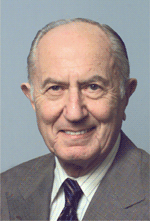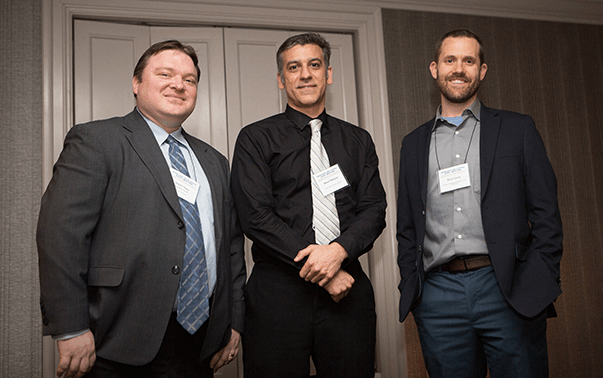The ASCI is pleased to recognize the 35 recipients of its 2018 Young Physician-Scientist Awards. The Awardees presented their work at the ASCI’s Food & Science Evening, on April 21, 2018, as part of the AAP/ASCI/APSA Joint Meeting, April 20-22, 2018.
|
Awardee
|
Institution
|
Abstract title
|
|
Ana Paula Abreu, MD, PhD |
Brigham and Women’s Hospital, Harvard Medical School |
MKRN3, a new player in the reproductive axis |
|
Raag D. Airan, MD, PhD |
Stanford University |
Spatiotemporally precise and versatile noninvasive neuromodulation via focused ultrasonic drug uncaging |
|
Francis J. Alenghat, MD, PhD |
University of Chicago |
Skap2 regulates atherosclerosis through macrophage polarization and efferocytosis |
|
Vivek K. Arora, MD, PhD |
Washington University School of Medicine |
Bladder-cancer-associated mutations in RXRA activate peroxisome proliferator-activated receptors to drive urothelial proliferation |
|
Megan T. Baldridge, MD, PhD |
Washington University School of Medicine |
Transferable microbiota factor stimulates resistance to norovirus infection in immunodeficient mice |
|
Scott W. Canna, MD |
University of Pittsburgh/Children’s Hospital of Pittsburgh |
Dysregulation of interleukin-18 diagnostically distinguishes and pathogenically promotes macrophage activation syndrome |
|
Brian Curran Capell, MD, PhD |
Perelman School of Medicine, University of Pennsylvania |
KMT2D regulates p63 target enhancers to coordinate epithelial homeostasis |
|
Kevin J. Cheung, MD |
Fred Hutchinson Cancer Research Center |
Tumor cell clustering promotes breast cancer metastasis by increasing apoptosis resistance and cell proliferation |
|
Silvia S. Chiang, MD |
Alpert Medical School of Brown University/ Hasbro Children’s Hospital/ Center for International Health Research |
Barriers to the diagnosis of childhood tuberculosis: a qualitative study |
|
Janet Chou, MD |
Boston Children’s Hospital |
Leucine-rich repeat–containing 8A (LRRC8A) is essential for T cell activation by non-hematopoietic antigen-presenting cells |
|
Louis Jared Cohen, MD, MS |
Icahn School of Medicine at Mount Sinai |
Bacterial modulation of human glycans in inflammatory bowel disease |
|
Kimberley Jane Evason, MD, PhD |
Huntsman Cancer Institute and University of Utah |
Serotonin in zebrafish liver development and tumorigenesis |
|
Jennifer E. Flythe, MD, MPH |
University of North Carolina-Chapel Hill |
Failed target weight achievement associates with short-term hospital encounters |
|
Robert David Guzy, MD, PhD |
University of Chicago |
Fibroblast growth factor 2 decreases bleomycin-induced pulmonary fibrosis through inhibition of fibroblast collagen production |
|
Andrew M. Intlekofer, MD, PhD |
Memorial Sloan Kettering Cancer Center |
Acquired clinical resistance to IDH inhibition through in trans IDH2 mutations |
|
Prasanna Jagannathan, MD |
Stanford University |
Impact of dihydroartemisinin-piperaquine for intermittent preventive treatment of malaria during pregnancy on risk of malaria in early childhood |
|
Benjamin Levi, MD |
University of Michigan |
Tuning inflammation to improve musculoskeletal wound healing through modification of monocyte/macrophage Tgfb1 |
|
Piro Lito, MD, PhD |
Memorial Sloan Kettering Cancer Center |
Modeling the evolution of resistance to ERK signaling inhibitors at the single cell level |
|
Steven E. Mansoor, MD, PhD |
Knight Cardiovascular Institute, Oregon Health and Science University |
Mechanisms of P2X receptor activation, desensitization, and antagonism |
|
Jonathan J. Miner, MD, PhD |
Washington University |
Mouse models of Zika virus pathogenesis |
|
Zaman Mirzadeh, MD, PhD |
Barrow Neurological Institute |
Perineuronal net formation in the hypothalamic arcuate nucleus-median eminence corresponds with the end of the critical period for AgRP/NPY neuron maturation |
|
Chiadi Ericson Ndumele, MD, PhD |
Johns Hopkins University |
The association of longitudinal changes in metabolic syndrome with incident heart failure: the Atherosclerosis Risk in Communities (ARIC) study |
|
Esther A. Obeng, MD, PhD |
St. Jude Children’s Research Hospital |
The nonsense-mediated decay pathway is a therapeutic vulnerability in myelodysplastic syndromes |
|
Michael Joseph Ombrello, MD |
National Institute of Arthritis and Musculoskeletal and Skin Diseases, NIH |
IL1RN variation is associated with systemic juvenile idiopathic arthritis and predicts non-response to anakinra treatment |
|
Cevher Ozcan, MD |
University of Chicago |
Mitochondrial mechanism of atrial fibrillation and novel therapies for primary prevention of the disease process |
|
James R. Priest, MD |
Stanford University School of Medicine |
Rare inherited variants confer substantial risk for congenital heart disease in a large British cohort |
|
Jarrad M. Scarlett, MD, PhD |
University of Washington |
Diabetes remission induced by the central action of fibroblast growth factor 1 |
|
Chetan Shenoy, MBBS |
University of Minnesota |
Long-term outcomes after detection of left ventricular thrombus by late gadolinium enhancement cardiovascular magnetic resonance imaging |
|
Neeraj K. Surana, MD, PhD |
Boston Children’s Hospital |
Moving beyond microbiome-wide associations to causal microbe identification |
|
David B. Sykes, MD, PhD |
Massachusetts General Hospital |
DHODH inhibition as differentiation therapy for acute myeloid leukemia: understanding the metabolic therapeutic window |
|
Viviany R. Taqueti, MD, MPH |
Brigham and Women’s Hospital |
Coronary microvascular dysfunction is a better discriminator of cardiovascular risk than body mass index in obese patients |
|
Sarah Kathleen Tasian, MD |
Children’s Hospital of Philadelphia and University of Pennsylvania |
Essential JAK, SRC, and PI3K signaling pathways regulate cell survival in human Ph-like acute lymphoblastic leukemia |
|
Kirk J. Wangensteen, MD, PhD |
University of Pennsylvania Perelman School of Medicine |
Novel combination therapy for hepatocellular carcinoma identified by genetic screening |
|
Melissa Y. Yeung, MD |
Harvard Medical School / Brigham and Women’s Hospital |
Identifying key regulators of B cell–mediated transplant tolerance |
|
Lilei Zhang, MD, PhD |
Baylor College of Medicine |
KLF15 regulates the circadian susceptibility to ischemia reperfusion injury in the heart |


